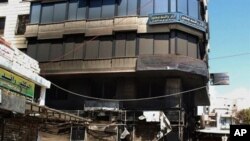Syrian protesters turned out Sunday demanding change in the face of violent reprisals from the government. But the government is blaming "armed gangs" for the violence.
Syrian officials say the "armed gangs" attacked civilians and government forces in Latakia, killing 12 people in the port city that has been rocked by demonstrations in recent days.
But witnesses tell a different tale: that it was government troops who opened fire Saturday and who, by Sunday, had consolidated their positions around the town. Amateur videos appear to back up those accounts, but the footage could not be independently confirmed. The Syrian government tightly controls the media, even in ordinary times.
There are reports from Daraa, a stronghold of anti-government sentiment, that hundreds of people kept up a protest vigil at al-Omari mosque.
Syrians abroad were also rallying, both for and against the government, at Syrian embassies in the region. In neighboring Lebanon, long dominated by Damascus, the majority voiced support for the government of President Bashar al Assad.
One man outside the embassy said he would be forever with Assad. He blamed the unrest on the media, calling them "enemies of the country."
There were also voices of dissent at the rally. Abed el Nasser says his feelings changed as the protests, and the crackdown, has progressed.
El Nasser says he used to like the Syrian leader, when he stood against Israel. But now, he says, Assad is shooting his own people.
The president is facing the most serious threat to his 11 year rule. Following the lead of other regional rulers, he has combined the security crackdown with talk of concessions. A government spokeswoman Sunday repeated a pledge that the country's dreaded emergency laws could be soon be lifted.
There was also talk that President Assad would soon address the nation, something he has not done even as the violence escalated over the past week.
But as political analyst Said Sadek of the American University in Cairo says, such actions are too little, too late.
“This new uprising is democratic, is not sectarian as they tried to convey to the people," said Sadek. "The people in Syria need human rights, need peace. They need development. They need an end of the corruption. They need the end of the clannish gang rule that is going on in the country.”
Sadek believes there has been a real transformation inside Syrian society so that people feel, after 40 years of minority Allouite rule, the country is ready for post-sectarian politics.
U.S. Secretary of State Hillary Clinton says despite the violence the situation has not progressed to the level seen in Libya. In an interview for the CBS program Face the Nation, Clinton said every situation is unique, and does not see the U.S. intervening militarily the way it is in Libya.
Syrian Demonstrators Blame Government for Violence




